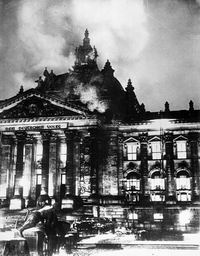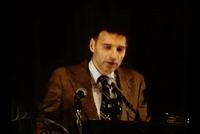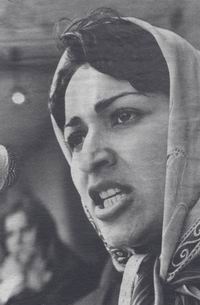Seeds of Fire: A People’s Chronology
Recalling events that happened on this day in history.
Memories of struggle, resistance and persistence.
Compiled by Ulli Diemer
|
February 27, 1848
|
|
|
In Mannheim, a people’s assembly of the German state of Baden adopts a resolution demanding a bill of rights. Similar resolutions are adopted in Württemberg, Hesse-Darmstadt, Nassau, and other German states.
|
|
February 27, 1933
|

|
|
The Reichstag Fire. The German Reichstag (Parliament building) in Berlin is gutted by a mysterious fire a month after Adolf Hitler’s Nazis take power. They blame the fire on a Communist conspiracy, and within hours proclaim an emergency decree which suspends civil liberties and bans publications considered unfriendly to the government. Thousands of Communists, including all Communist members of parliament, are arrested and imprisoned. An ‘Enabling Decree’ is then passed on March 23, 1933 which allows Hitler to rule by decree, making him dictator of Germany.
|
|
February 27, 1934
|

|
|
Birth of Ralph Nader, American political activist and critic of corporate power.
|
|
February 27, 1956
|

|
|
Birth of Meena Keshwar Kamal, founder of the Revolutionary Association of the Women of Afghanistan.
|
|
February 27, 1973
|

|
|
About 200 Oglala Lakota and followers of the American Indian Movement (AIM) seize and occupy the town of Wounded Knee, South Dakota on the Pine Ridge Indian Reservation. Oglala and AIM activists control the town for 71 days while the United States Marshals Service, Federal Bureau of Investigation agents and other ‘law enforcement’ agencies cordon off the area.
|
|
February 27, 1989
|
|
|
A protest in the Venezuelan city of Plaza against a nation-wide increase in bus fares and other neo-liberal policies spreads to the capital, Caracas, leading to a wave of protests and riots which become known as the Caracazo. The government responds by declaring martial law and bringing in the army and police, who kill an estimated 2,000 people in the process of 'restoring order.' The government subsequently backs down on some of the worst of the neo-liberal reforms. In 1999, the Inter-American Court of Human Rights hears the case and finds that the government committed violations of human rights, including extrajudicial killings.
|

